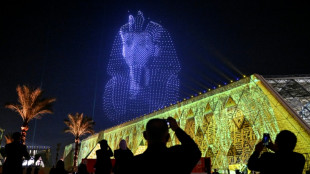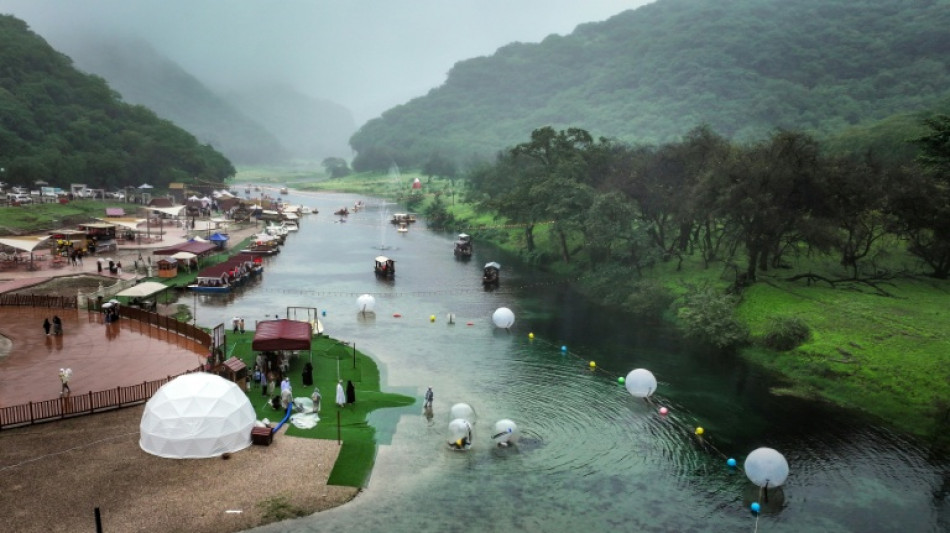
-
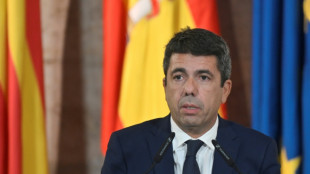 Spain regional leader resigns, a year after deadly floods
Spain regional leader resigns, a year after deadly floods
-
Video game creators fear AI could grab the controller

-
 France threatens Shein ban if 'childlike' sex dolls reappear
France threatens Shein ban if 'childlike' sex dolls reappear
-
International cricket returns to Faisalabad with Pakistan-South Africa ODIs

-
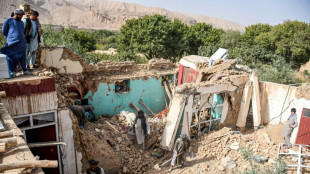 Afghan govt says quake kills 20, injures over 500
Afghan govt says quake kills 20, injures over 500
-
'We're all too rich,' says photo legend Martin Parr

-
 Tanzania president inaugurated as opposition says hundreds dead
Tanzania president inaugurated as opposition says hundreds dead
-
Shafali Verma: India's World Cup hero who disguised herself as boy

-
 Most equity markets rise on lingering trader optimism
Most equity markets rise on lingering trader optimism
-
Afghanistan quake kills 20, injures over 300: health ministry
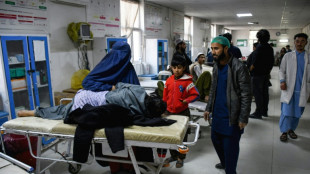
-
 India hails maiden women's World Cup cricket title as game-changer
India hails maiden women's World Cup cricket title as game-changer
-
As clock ticks down, Greece tries to clean up its act on waste
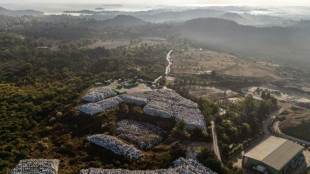
-
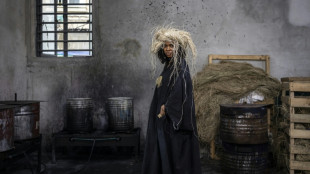 Local fabrics, fibres shine at eco-centred Lagos Fashion Week
Local fabrics, fibres shine at eco-centred Lagos Fashion Week
-
Spalletti bidding to revive Juve and reputation ahead of Sporting visit in Champions League

-
 Tanzania president to be inaugurated as opposition says hundreds dead
Tanzania president to be inaugurated as opposition says hundreds dead
-
Bouanga brace as LAFC beats Austin 4-1 to advance in MLS Cup playoffs

-
 'Golden age': Japan hails Yamamoto, Ohtani after Dodgers triumph
'Golden age': Japan hails Yamamoto, Ohtani after Dodgers triumph
-
Thunder roll over Pelicans to remain NBA's lone unbeaten team

-
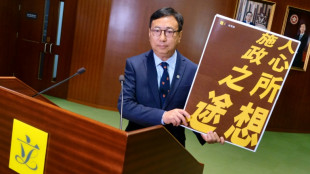 Hong Kong legislature now an 'echo chamber', four years after shake-up
Hong Kong legislature now an 'echo chamber', four years after shake-up
-
Most Asian markets rise on lingering trader optimism

-
 Andrew to lose his last military rank: defence minister
Andrew to lose his last military rank: defence minister
-
Trump's global tariffs to face challenge before Supreme Court

-
 Barnstorming Bayern face acid test at reigning champions PSG
Barnstorming Bayern face acid test at reigning champions PSG
-
Alonso shaping new Real Madrid on Liverpool return

-
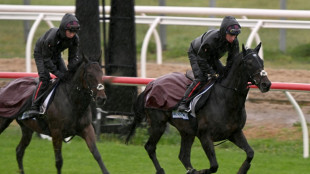 Half Yours favourite at Australia's 'race that stops a nation'
Half Yours favourite at Australia's 'race that stops a nation'
-
Tonga rugby league star has surgery after 'seizure' against NZ

-
 Trent's return with Real Madrid reminds Liverpool of what they are missing
Trent's return with Real Madrid reminds Liverpool of what they are missing
-
Tehran toy museum brings old childhood memories to life
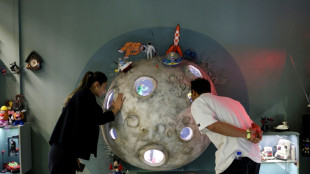
-
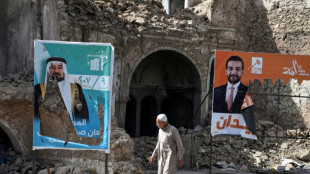 Iran banking on Iraq vote to retain regional influence
Iran banking on Iraq vote to retain regional influence
-
Daughter of 'underground' pastor urges China for his release
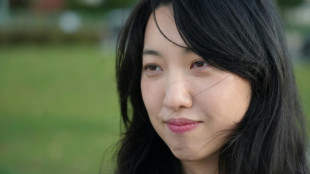
-
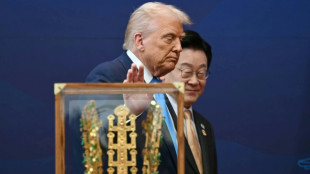 Trump the Great? President steps up power moves
Trump the Great? President steps up power moves
-
Fire ravages French monastery dubbed 'Notre-Dame of the Ardennes'
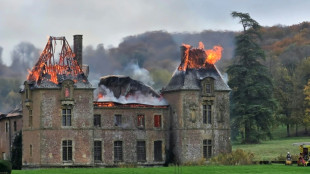
-
 Bills outlast Chiefs while NFL-best Colts fall to Steelers
Bills outlast Chiefs while NFL-best Colts fall to Steelers
-
NBA champion Thunder roll over Pelicans to remain unbeaten

-
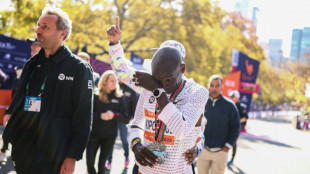 Eliud Kipchoge unveils plan to run 7 marathons on 7 continents
Eliud Kipchoge unveils plan to run 7 marathons on 7 continents
-
Milan deny Roma top spot in Serie A, Inter beat Verona

-
 Lens back up to third in Ligue 1 as Lyon held at Brest
Lens back up to third in Ligue 1 as Lyon held at Brest
-
NFL-best Colts fall to Steelers, Packers lose to Carolina

-
 'Regretting You' wins spooky slow N. American box office
'Regretting You' wins spooky slow N. American box office
-
'Just the beginning' as India lift first Women's World Cup

-
 Will Still sacked by struggling Southampton
Will Still sacked by struggling Southampton
-
Malinin wins Skate Canada crown with stunning free skate

-
 Barca beat Elche to recover from Clasico loss
Barca beat Elche to recover from Clasico loss
-
Jamaica deaths at 28 as Caribbean reels from colossal hurricane
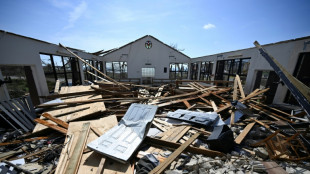
-
 Verma and Sharma power India to first Women's World Cup triumph
Verma and Sharma power India to first Women's World Cup triumph
-
Auger-Aliassime out of Metz Open despite not yet securing ATP Finals spot

-
 Haaland fires Man City up to second in Premier League
Haaland fires Man City up to second in Premier League
-
Sinner says staying world number one 'not only in my hands'

-
 Ready for it? Swifties swarm German museum to see Ophelia painting
Ready for it? Swifties swarm German museum to see Ophelia painting
-
Pope denounces violence in Sudan, renews call for ceasefire
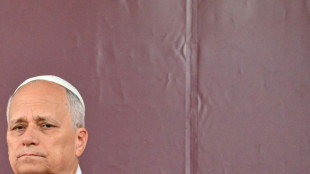

With poetry and chants, Omanis strive to preserve ancient language
Against the backdrop of southern Oman's lush mountains, men in traditional attire chant ancient poems in an ancient language, fighting to keep alive a spoken tradition used by just two percent of the population.
Sitting under a tent, poet Khalid Ahmed al-Kathiri recites the verses, while men clad in robes and headdresses echo back his words in the vast expanse.
"Jibbali poetry is a means for us to preserve the language and teach it to the new generation," Kathiri, 41, told AFP.
The overwhelming majority of Omanis speak Arabic, but in the mountainous coastal region of Dhofar bordering Yemen, people speak Jibbali, also known as Shehri.
Researcher Ali Almashani described it as an "endangered language" spoken by no more than 120,000 people in a country of over five million.
- 'Protected by isolation' -
While AFP was interviewing the poet, a heated debate broke out among the men over whether the language should be called Jibbali -- meaning "of the mountains" -- or Shehri, and whether it was an Arabic dialect.
Almashani said it was a fully-fledged language with its own syntax and grammar, historically used for composing poetry and proverbs and recounting legends.
The language predates Arabic, and has origins in Semitic south Arabian languages, he said.
He combined both names in his research to find a middle ground.
"It's a very old language, deeply rooted in history," Almashani said, adding that it was "protected by the isolation of Dhofar".
"The mountains protected it from the west, the Empty Quarter from the north, and the Indian Ocean from the south. This isolation built an ancient barrier around it," he said.
But remoteness is no guarantee for survival.
Other languages originating from Dhofar like Bathari are nearly extinct, "spoken only by three or four people," he said.
Some fear Jibbali could meet the same fate.
Thirty-five-year-old Saeed Shamas, a social media advocate for Dhofari heritage, said it was vital for him to raise his children in a Jibbali-speaking environment to help keep the language alive.
Children in Dhofar grow up speaking the mother-tongue of their ancestors, singing along to folk songs and memorising ancient poems.
"If everyone around you speaks Jibbali, from your father, to your grandfather, and mother, then this is the dialect or language you will speak," he said.
- Not yet documented -
The ancient recited poetry and chants also preserve archaic vocabulary no longer in use, Shamas told AFP.
Arabic is taught at school and understood by most, but the majority of parents speak their native language with their children, he said.
After the poetry recital, a group of young children nearby told AFP they "prefer speaking Jibbali over Arabic".
But for Almashani, the spectre of extinction still looms over a language that is not taught in school or properly documented yet.
There have been recent efforts towards studying Jibbali, with Oman's Vision 2040 economic plan prioritising heritage preservation.
Almashani and a team of people looking to preserve their language are hoping for support from Dhofar University for their work on a dictionary with about 125,000 words translated into Arabic and English.
The project will also include a digital version with a pronunciation feature for unique sounds that can be difficult to convey in writing.
T.Ziegler--VB

